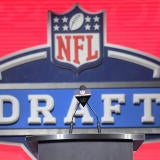NFL teams collectively having over $1 billion of salary-cap space at their disposal when free agency started on March 14 produced some mind-boggling contracts. Several franchises with more than $60 million of cap room were intent on putting the space to use.
With the first wave of free agency over, the pendulum has swung in the other direction. It's no longer a seller's market. Teams are exercising more fiscal restraint and starting to sign players at a much better value. Nearly all of the consensus best players available at the start of free agency have been signed.
The NFL annual owners meeting, which will be March 25-28 in Orlando, Florida, typically signifies the end of free agency, for all practical purposes. After the meeting wraps up, teams will devote most of their attention to the NFL Draft, to be held April 26-28.
Here are 10 contract-related thoughts and observations about free agency.
1. Kirk Cousins' game changer
Quarterback Kirk Cousins is breaking new ground with the NFL's first lucrative fully-guaranteed veteran contract. He signed a three-year, $84 million deal (worth a maximum of $90 million through incentives) with the Vikings, making him the NFL's highest-paid player at $28 million per year. The contract also contains a no-trade clause and language preventing Minnesota from designating Cousins as a franchise or transition player.
Cousins' landmark contract sets the stage for other high-profile players, like Packers quarterback Aaron Rodgers, to push for fully-guaranteed contracts. A new contract for Rodgers is on the horizon this offseason. At the very least, Cousins has given Rodgers and Falcons quarterback Matt Ryan, who is entering his contract year, the ammunition to become charter members of the $30-million-per-year club. The Jets reportedly made Cousins a $30-million-per-year offer.
Cousins opted for a shorter contract than most quarterbacks sign. Most lucrative quarterback contracts are at least four years in length. The 29-year-old Cousins is in a better position to take advantage of changing market conditions sooner than with the more conventional quarterback deal. He would be in line for an extension at age 31 in 2020 if he is living up to his contract. Cousins is set to hit the open market at 32 in 2021, when a new Collective Bargaining Agreement will need to be negotiated, which could be more favorable to players than the current labor agreement.
2. It pays to catch passes
Wide receiver salaries have unexpectedly exploded. The salary explosion can be attributed to a relatively weak group of receivers available in the upcoming NFL draft and the 2017 draft class struggling.
The most surprising deal belongs to Sammy Watkins. The Chiefs gave him a three-year, $48 million contract with $30 million fully guaranteed. The 2014 fourth-overall pick is being paid like an elite receiver without matching production. Watkins caught a rather pedestrian 39 passes for 593 yards and eight touchdowns with the Rams last season after being traded from the Bills during training camp. Watkins' only 1,000-receiving-yard season came in 2015. Prior to the trade, the Bills passed on a fifth-year option in 2018 for Watkins at $13.258 million due to his persistent problems with a broken left foot.
The Bears are confident Allen Robinson can completely recover from the left ACL tear he suffered in the 2017 season opener. He signed a three-year, $42 million contract with $25.2 million in guarantees. In 2015, Robinson became the first Jaguars player to top 1,000 receiving yards (1,400) since Jimmy Smith in 2005. He also led the NFL with 31 catches of 20 or more yards.
The Jaguars are attempting to make up for the loss of Robinson with Donte Moncrief, who was plagued by injuries the last two seasons. Despite catching only 56 passes for 698 yards and nine touchdowns with the Colts in 2016 and 2017, he received a fully-guaranteed one-year, $9.6 million contract. Moncrief can earn up to another $2 million through incentives.
Marqise Lee remained in Jacksonville with a four-year, $34 million contract, with $16.5 million fully guaranteed. The deal is worth a maximum of $38 million with incentives. Lee had a career-best 851 receiving yards in 2016.
Albert Wilson and Paul Richardson signed deals comparable to Lee's with lesser production. A career-high 42 receptions and 554 receiving yards for the Chiefs in 2017 landed Wilson a three-year, $24 million contract from the Dolphins with $14.45 million fully guaranteed. Richardson, who was Lee's teammate in high school, finally shook off the injury bug in 2017 to catch 44 passes for 703 yards and six touchdowns with the Seahawks. He received a five-year, $40 million contract containing $20 million in guarantees from the Redskins.
3. Gaming the system (Trumaine's triumph)
Kirk Cousins gets credit for creating a new blueprint for players to follow when given a franchise tag. The quarterback bet on himself during the 2016 and 2017 seasons by embracing the franchise tag, which led to him signing the first fully-guaranteed NFL veteran contract ($84 million over three years with the Vikings).
Cornerback Trumaine Johnson taking the same approach has flown somewhat under the radar. After making just under $30.7 million the last two seasons playing for the Rams on franchise tags, Johnson signed a five-year, $72.5 million deal with the Jets containing $45 million in guarantees, of which $34 million is fully guaranteed at signing.
Thanks to using the franchise tag to his advantage, Johnson is making a little less than $56.7 million from 2016 through 2018, which includes the first year of his new Jets contract. The almost $56.7 million is NFL-record compensation for a cornerback over a three-year period.
4. It starts in the trenches
Offensive linemen were the biggest beneficiaries of the free-agency spending spree in 2017. The salary bar has been raised at the three primary offensive-line positions (center, guard and tackle) in free agency this year.
Nate Solder has taken the tackle market to unprecedented heights. The Giants gave Solder a four-year, $62 million contract with $34.8 million fully guaranteed. The deal makes him the NFL's highest-paid offensive lineman at $15.5 million per year.
Andrew Norwell re-set the guard market with the five-year, $66.5 million contract containing $30 million fully guaranteed he received from the Jaguars. The Buccaneers made Ryan Jensen the NFL's highest-paid center on a deal averaging $10.5 million per year. Jensen signed a four-year, $42 million contract with $22 million in guarantees.
Offensive-lineman salaries may continue to escalate this offseason. Norwell's contract is expected to be the salary floor for any contract extension that Zack Martin, who has been a Pro Bowler in each of his four NFL seasons, signs with Cowboys. It's probably going to require the Titans making a similar commitment as the Giants did with Solder to get two-time Pro Bowl left tackle Taylor Lewan, who is scheduled to play the 2018 season on a $9.431 million fifth-year option, signed long term.
5. Drew Brees' discount
There's a good chance Brees could have become the NFL's first $30 million player on a short-term deal had he not given the Saints a financial break for the first time in numerous contract dealings with the franchise. The 39 year old took a two-year, $50 million contract with $27 million fully guaranteed to remain in New Orleans after refusing to explore his options with other teams. The fully-guaranteed amount equals Brees' 2018 salary. Brees has a whopping $33.5 million cap number in 2019. Just like in the one-year, $24.25 million extension Brees signed in 2016, the clauses prohibiting the Saints from designating Brees as a franchise or transition player, or trading him without his consent, were once again included. The 2020 contract year automatically voids on the last day of the 2019 league year (mid-March 2020).
6. Gronkowski's grumpiness?
The Patriots finally addressed Rob Gronkowski's perpetual unhappiness with the six-year, $54 million extension he signed in 2012 to become the NFL's highest-paid tight end by average yearly salary. Last offseason, $5.5 million of unlikely-to-be-earned incentives were added to Gronkowski's contract. He earned the entire amount when he was named first team All-Pro by the Associated Press.
Gronkowski surprised many after Super Bowl LII with the revelation that he is contemplating retirement, which could just be a negotiating ploy. He is scheduled to make $9 million this year. The four-year, $32 million contract a largely unproven Trey Burton received from the Bears may only provide more confirmation to Gronkowski that something more than another short-term fix with incentives should be done with his contract. Burton has $11.3 million in the first contract year. Jimmy Graham at age 31 remaining the NFL's only $10 million-per-year tight end despite a sizable statistical regression in 2017 on his new deal with the Packers may add insult to injury. Graham is making $13 million in 2018.
7. 49ers' gold rush
The 49ers ending the 2017 regular season on high note with a five-game winning streak has extended to the offseason. Quarterback Jimmy Garoppolo, the architect of San Francisco's late-season success, signed a five-year, $137.5 million contract with $74.1 million of guarantees shortly after the playoffs ended.
All-Pro cornerback Richard Sherman, who is recovering from a ruptured Achilles tendon, was a low-risk, high-reward signing after he refused to take a pay cut to remain with the Seahawks. He represented himself in signing a team-friendly three-year, $27.15 million deal, which is worth a maximum of $38.15 million through not-so-easily-achievable salary escalators and incentives.
The interior of the offensive line was solidified in signing center Weston Richburg to a five-year, $47.5 million contract with $28.5 million of guarantees. The 49ers raised some eyebrows by giving running back Jerick McKinnon a four-year, $30 million deal with $14.3 million in guarantees to bring his dual-threat capabilities to the Bay Area.
A changing of the guard appears to be taking place in the NFC West with the Seahawks' purging of the roster. As a team on rise, the 49ers are expected to contend for a playoff spot in 2018.
8. Familiarity brings comfort
A strong tie or positive experience between a player and coach or team executive has led to a few reunions during the offseason. Case Keenum signed a two-year, $36 million contract (worth a maximum of $38 million through incentives) containing $25 million fully guaranteed with the Broncos to try to solve their quarterback woes. The undrafted free agent got his start in the NFL with the Texans in 2012, when Broncos senior personnel executive Gary Kubiak was their head coach.
Bills head coach Sean McDermott got a firsthand look at defensive tackle Star Lotulelei, who was the 14th-overall pick in the 2013 draft, as Panthers defensive coordinator during his first four NFL seasons. Buffalo signed Lotulelei to a five-year, $50 million deal with $25 million in guarantees.
Titans general manager Jon Robinson and new head coach Mike Vrabel tapped their Patriots roots to sign cornerback Malcolm Butler and running back Dion Lewis. Butler received a five-year, $61.25 million contract with $30 million in guarantees. Robinson has used free agency the last two years to acquire New England's starting cornerback tandem from the 2015 and 2016 seasons (adding Logan Ryan a year ago). Lewis signed a four-year, $19.8 million contract. Salary escalators and incentives make the deal worth up to $22.2 million.
9. The new Packers philosophy
Former Packers general manager Ted Thompson, whose 13-year tenure came to close at the end of the 2017 season, made limited use of free agency. He preferred a draft-and-develop approach in building Green Bay's roster.
New general manager Brian Gutekunst has been much more aggressive in free agency than Thompson ever was. Wide receivers Allen Robinson and Sammy Watkins were pursued before signing tight end Jimmy Graham to a three-year, $30 million contract. Two-time NFL MVP quarterback Aaron Rodgers' favorite target, Jordy Nelson, became a salary-cap casualty because of the Graham signing.
Cornerback Trumaine Johnson was initially on Gutekunst's radar screen. He signed Bears cornerback Kyle Fuller, who was designated as a transition player, to a four-year, $56 million offer sheet that reportedly has $29 million effectively fully guaranteed at signing. The Bears quickly exercised their right to match.
Defensive end Muhammad Wilkerson was signed to a one-year, $5 million "prove it" deal worth as much as $8.75 million with incentives. The two-time second team All-Pro is trying to bounce back from two subpar seasons with the Jets after being released from the five-year, $86 million contract he signed in 2016 as a franchise player.
Gutekunst is adhering to Green Bay's long-standing policy of structuring contracts where a signing bonus is the only form of guaranteed money in free agency this year. The lone exception has been Rodgers, whose contracts have salary guarantees. Gutekunst may have to revisit this policy in the future if he going to consistently be a participant in the first wave of free agency.
10. Chase Daniel's charmed life
Daniel continues to make out like a bandit relative to his actual playing opportunities. He's had only two starts during his nine NFL seasons. Daniel's last one came at the end of the 2014 season. He's taken just 24 offensive snaps since then. For his career, Daniel has completed 51 of 78 passes (65.4 completion percentage) for 480 yards.
Daniel has made over $22 million in the five NFL seasons since first becoming an unrestricted free agent in 2013. Thanks to a good relationship with new Bears head coach Matt Nagy, he signed a two-year, $10 million contract with the Bears, his fourth NFL team in as many seasons, to back up and mentor 2017 second-overall pick Mitchell Trubisky. Nagy was Daniel's quarterback coach during his three-year stint from 2013 through 2015 backing up Alex Smith in Kansas City.
Daniel won't see the field any more than he has the last three seasons if all goes according to plan in Chicago. Nice lucrative work if you can get it.





















